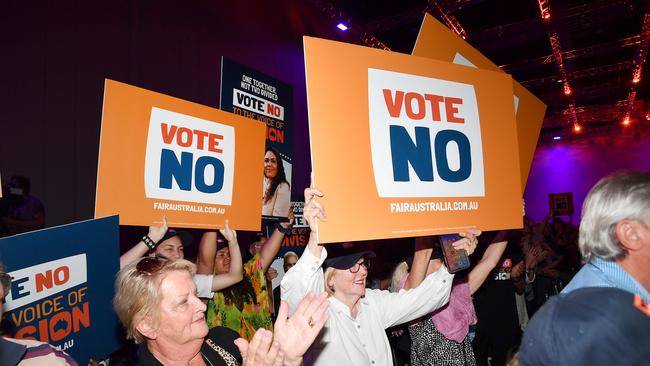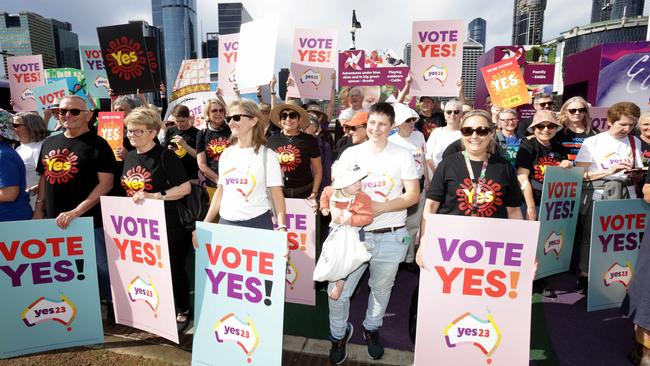Win or lose, what comes next after the Voice referendum matters
Politicians who have so heavily involved themselves in the Voice referendum must have an answer for what comes after polling day on October 14, writes Clare Armstrong.
Opinion
Don't miss out on the headlines from Opinion. Followed categories will be added to My News.
In two weeks’ time, Australians will wake up to an irrevocably changed country.
Win or lose, the outcome of the referendum to constitutionally enshrine a Voice to Parliament will have a lasting impact on how this country discusses and addresses Indigenous disadvantage.
A Yes win would set in motion a series of parliamentary committees, consultation, legislation and debate to establish a Voice, as a wary electorate watches on, wondering if the advisory body will ever live up to its promise.
The far more likely result, according to the polls, of a No win — potentially with a double majority defeat — will prompt a very different but no-less important national conversation.
A simple question, with a very unclear answer: what comes next?

Aboriginal and Torres Strait Islander people have a life expectancy of eight years less than their fellow non-Indigenous Australians, they die by suicide at twice the rate and Indigenous men are more likely to end up in jail than go to university.
These statistics would not change overnight if the Voice succeeded but a Yes result would kick start a new approach to try to address the damning gap between Indigenous and non-Indigenous Australia.
The path would be clear, even if the outcomes were uncertain.
But the steps after a No result are utterly opaque.
Anthony Albanese has largely refused to engage in hypotheticals about what he would do if the referendum was defeated but last week he suggested the vote had been worth having if only to put Indigenous affairs at the forefront of the national conversation.
Given 13YARN, an Indigenous mental health helpline run by Lifeline, recently reported a 108 per cent increase in calls for assistance, it’s difficult to imagine Aboriginal communities thanking the Prime Minister for the kind of conversation actually happening in many parts of Australia.
The pressure would be on Albanese to come up with a next move after a failed referendum and nothing less than a comprehensive policy response — that specifically involves consultation and listening to Indigenous Australians — could be sufficient.
But opponents of the Voice cannot escape the same question.
Opposition leader Peter Dutton has pledged any future Coalition government he leads would hold a second referendum to recognise Aboriginal and Torres Strait Islander people as Australia’s First Nations people. But this symbolic move alone does nothing to shift the dial on disadvantage.
Dutton has recognised this in throwing his support behind regional and local voices, which he has backed as the key to addressing the Gap.
How these grassroots voices reach Canberra is a question no-one in the Coalition has been able to answer.

It is an empirical fact based on surveys of Indigenous communities by respected polling companies that there is majority support for the Voice proposal among Aboriginal and Torres Strait Islander people.
The vote count at polling booths in areas with a high Indigenous population will crystalise the final extent of this support but it remains unfair and incorrect to dismiss the proposal as having only gained the backing of the so-called Indigenous “elites”.
Of the No voters within Indigenous communities, a significant number who have spoken up publicly say they oppose Voice because they do not believe it will deliver the practical outcomes promised by its proponents.
These two cohorts combined — those who support the Voice and those who oppose but want stronger action — deserve serious and considered responses to the question of what happens after a No vote.
The majority of Australians would largely go about their day unaffected if the referendum was defeated.
But there will be no return to normal for many Indigenous Australians.
A No result sends their communities back to the drawing table after having fought for so long to have their idea, a Voice, considered and accepted by the public. Even if there are those who are willing to go another round and start the next fight, the likelihood of being met by a clear-eyed policy discussion seems low.
Squabbles over the political spoils of the result, a desire from leaders to show they’re moving on and addressing big national issues, like cost of living, and an inevitable fracturing among Indigenous leaders who have given so much of themselves to the referendum will distract from, paralyse and ultimately overshadow any Closing the Gap debate.
All the while expect 13YARN to be inundated with calls for assistance from Indigenous Australians caught in the middle of a public conversation they feel they have no control over.
There is nothing wrong with Yes campaigners trying to remain positive and refusing to engage in “what ifs” that, if their hopes come to fruition, may never need to be answered.
But it’s incumbent on the government and politicians who have involved themselves so heavily in the referendum to have a very clear plan for October 15.





